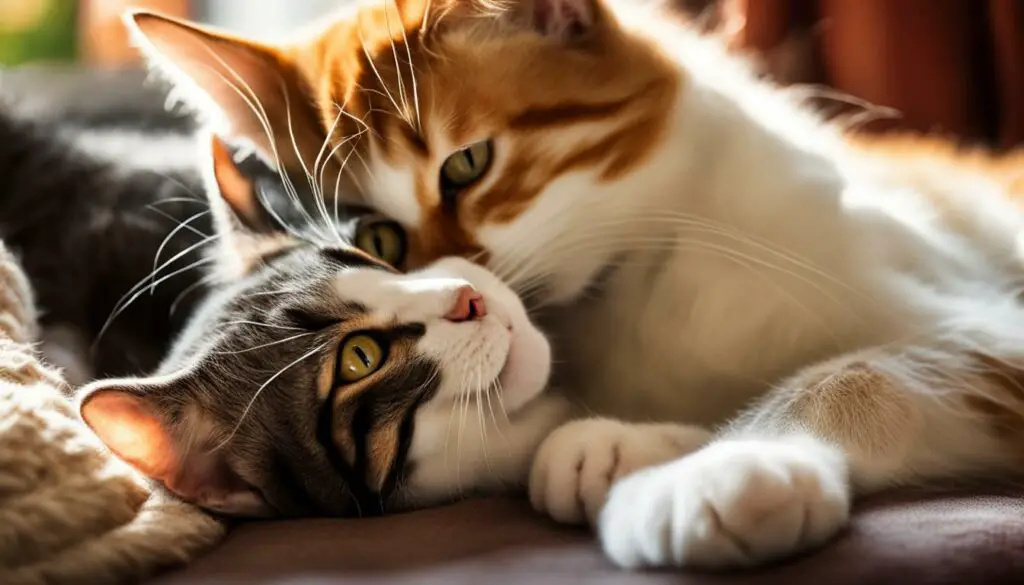Are you considering getting a kitten for your cat? It’s a decision that shouldn’t be taken lightly, as it can greatly impact your cat’s life and well-being. In this article, I will explore the benefits of getting a kitten for your cat, as well as the things you should consider before making this important decision.
Cats are known to be family-oriented and often thrive when they have a feline companion. However, when it comes to adopting an adult cat, it may be best to introduce only one cat to the family. The decision to get a kitten for your cat should be based on their personality and tendencies towards sociability with other cats.
Key Takeaways:
- Getting a kitten for your cat can provide companionship and mental stimulation.
- Consider your cat’s age, personality, and past experiences with other cats before making a decision.
- Introducing a new kitten to your cat requires patience and gradual introductions.
- Assess your own resources and ability to care for multiple cats before adopting another cat.
- Ensure each cat’s individual needs are met to create a harmonious multi-cat household.
The Benefits of Getting a Kitten for Your Cat
Adding a kitten to your household can bring numerous benefits for your cat. Not only will it provide companionship, but it can also lead to increased playtime and mental stimulation. Kittens are full of energy and curiosity, which can help alleviate boredom and loneliness for your cat. They can engage your cat in interactive play sessions, keeping them physically active and mentally alert.
Moreover, having a kitten around can offer a valuable learning opportunity for your cat. Kittens are naturally social creatures and can teach your cat important social behaviors. Your cat can observe and imitate the kitten’s playfulness, grooming habits, and communication skills, helping them develop a better understanding of feline interactions.
Additionally, the presence of a kitten can bring new life to your home and create a dynamic and entertaining environment. Cats often enjoy watching and interacting with each other, providing hours of amusement for both pets and their human companions. Witnessing their playful exchanges and cuddling sessions can bring joy and warmth to your heart.
| Benefits of Getting a Kitten for Your Cat |
|---|
| Companionship |
| Increased playtime and mental stimulation |
| Opportunity for learning social behavior |
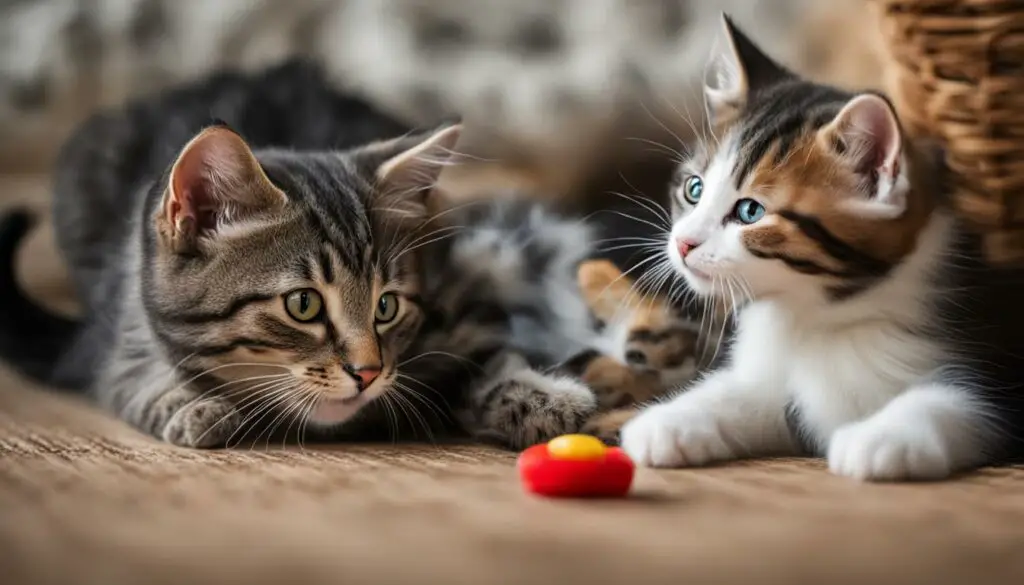
Testimonial:
“Since introducing a kitten to our cat, the transformation has been amazing. They have become inseparable playmates, and our cat’s energy levels have skyrocketed. It’s been a delight to watch them learn and grow together.”
While there are many advantages to getting a kitten for your cat, it’s essential to consider your cat’s personality and preferences before making a decision. Some cats may not tolerate the presence of another cat, while others may thrive in a multi-cat household. Observing your cat’s behavior and consulting with a veterinarian or animal behaviorist can help you make an informed choice for the well-being of your cat and the harmony of your home.
Things to Consider Before Getting a Kitten for Your Cat
Before making the decision to get a kitten for your cat, there are several important factors to consider. Each cat is unique, and their individual personalities, age, and past experiences with other cats can greatly influence the success of introducing a new kitten into their lives.
First and foremost, assess your cat’s age and temperament. Some adult cats may not tolerate the presence of another cat, especially if they have been the sole feline in the household for a long time. It’s crucial to understand your cat’s preferences and consider their comfort level with sharing their space and attention.
Furthermore, evaluate your cat’s past experiences with other cats. If they have had positive interactions with other felines in the past, it may be a good indication that they would benefit from the companionship of a kitten. On the other hand, if your cat has displayed aggression or fear towards other cats, it’s essential to proceed with caution and seek professional advice if needed.
Consulting with a veterinarian or an animal behaviorist can provide valuable insight into your cat’s behavior and help you make an informed decision. They can assess your cat’s sociability, suggest appropriate strategies for introducing a new kitten, and offer guidance on managing any potential challenges that may arise.
Considerations Before Getting a Kitten for Your Cat:
- Assess your cat’s age, personality, and temperament.
- Evaluate your cat’s past experiences with other cats.
- Consult with a veterinarian or animal behaviorist for expert advice.
Remember, the decision to get a kitten for your cat should prioritize their well-being, happiness, and overall compatibility. By carefully considering these factors and seeking professional guidance, you can create a harmonious and fulfilling multi-cat household.
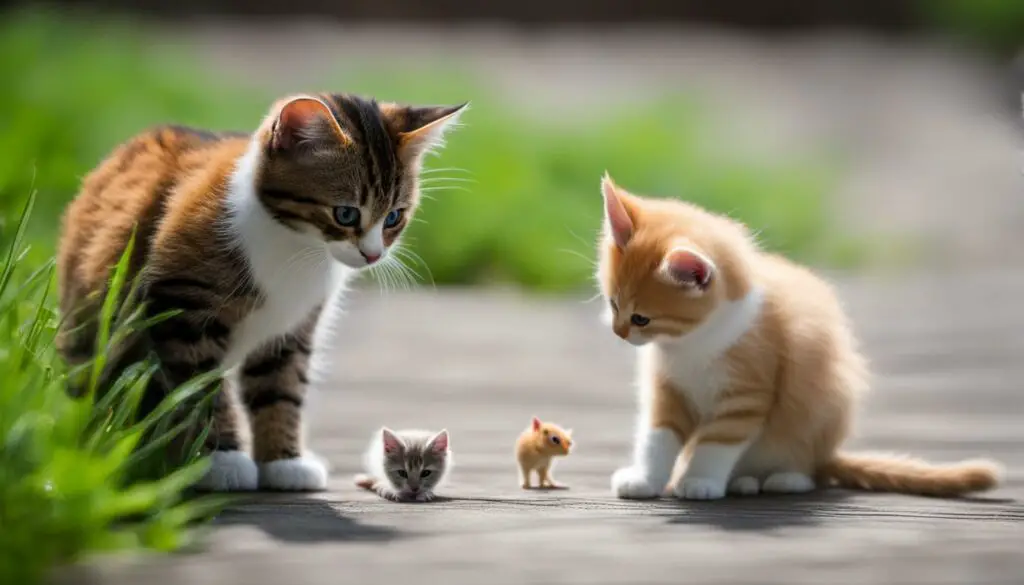
Table: Pros and Cons of Getting a Kitten for Your Cat
| Pros | Cons |
|---|---|
| Companionship and social interaction for your cat | Potential territorial disputes and conflicts |
| Increased playtime and mental stimulation | Additional cost for food, litter, and veterinary care |
| Opportunity for your cat to learn social behavior from another feline | Possibility of stress and adjustment period for both cats |
Introducing a New Kitten to Your Cat
Introducing a new kitten to your cat is an exciting but delicate process that requires patience and careful observation. By taking it slow and following a gradual introduction plan, you can help your cat and new kitten form a positive bond. Here are some steps to consider when introducing a new kitten to your cat:
Separate Spaces
Initially, provide a separate space for the new kitten with their own bedding, feeding area, and litter box. This allows your cat and the new kitten to acclimate to each other’s scents without direct contact. Gradually, introduce the scents of the new kitten to your cat by swapping bedding or using a cloth to stroke both cats, allowing them to become familiar with each other’s scent.
Visual Introduction
After a few days, you can start the visual introduction by using a baby gate or screen door to separate the two cats while allowing them to see each other. This allows for visual stimulation and helps them get used to each other’s presence. If there are no signs of aggression or fear, you can proceed to the next stage of introduction.
Supervised Interactions
When both cats appear comfortable with each other’s presence, you can begin supervised interactions. These interactions should be short and gradually increase in duration. Keep a close eye on how your cat and new kitten interact. If any signs of aggression or fear arise, separate them and go back to the previous stage until they are more comfortable.
Remember, every cat is unique, and the introduction process may vary. It’s important to monitor their behavior, be patient, and make adjustments as needed to ensure a successful integration. By following these steps and providing a gradual introduction, you can help your cat and new kitten develop a positive relationship and create a harmonious multi-cat household.
Considerations for Adopting a Second Cat for Your Adult Cat
When thinking about adopting a second cat for your adult cat, it’s essential to take into account their temperament and preferences. Not all adult cats will welcome the presence of another feline companion, so it’s crucial to carefully assess your cat’s behavior and social tendencies before making a decision.
Some adult cats are more tolerant of kittens and may benefit from the companionship and playtime they offer. On the other hand, some cats prefer to be the only cat in the household and may become stressed or agitated by the introduction of a new feline.
An important factor to consider is the existing cat’s personality and their history with other cats. If your cat has had positive experiences with other cats in the past or has previously lived with another cat without any issues, they may be more likely to accept a new feline companion. However, if your cat has shown aggression or territorial behavior towards other cats, it’s best to seek professional advice before proceeding with adoption.

Creating a Smooth Transition
To ensure a smooth transition when adopting a second cat, it’s important to introduce the cats gradually and provide them with separate spaces in the beginning. This will allow them to become familiar with each other’s scents and presence without feeling overwhelmed.
Start by providing a separate room for the new cat with their own litter box, food, and water bowls, as well as a cozy bed. Allow the cats to get used to each other’s scents by swapping bedding or using a pheromone diffuser to create a calming environment.
Once the cats have become comfortable with each other’s scents, you can start introducing them through controlled and supervised interactions. It’s important to monitor their behavior closely during these initial meetings and intervene if any signs of aggression or stress arise. Gradually increase the duration and frequency of their interactions as they become more comfortable with each other.
The Benefits of Having a Kitten with Your Adult Cat
Having a kitten as a companion for your adult cat can have several benefits. Kittens are full of energy and can provide entertainment for your adult cat, helping to alleviate boredom and loneliness. They can also teach your adult cat social behaviors, such as proper play and communication, through interactive play sessions.
Additionally, the presence of a kitten can stimulate your adult cat’s natural hunting instincts, leading to increased physical activity and mental stimulation. This can be especially beneficial for older cats who may have become less active and may benefit from the extra exercise and mental engagement provided by a playful kitten.
Kitten Care for My Cat
When you have multiple cats, it’s essential to meet their individual needs to ensure a harmonious and fulfilling environment for all. Here are some key aspects to consider when it comes to kitten care for your cat:
Social Interaction
Each cat requires social interaction to thrive. Set aside dedicated playtime for each cat, providing interactive toys and engaging in activities that promote exercise and mental stimulation. This not only helps prevent boredom but also strengthens the bond between you and your cats.
Physical Exercise
Physical exercise is crucial for your cats’ overall well-being. Ensure they have enough space to run, jump, and climb. Consider providing vertical spaces like cat trees or shelves where they can explore and relax. Additionally, interactive toys and puzzle feeders can help keep them physically engaged.
Mental Stimulation
Cats are intelligent creatures that need mental stimulation to stay happy and healthy. Provide toys that challenge their problem-solving skills, such as treat-dispensing puzzles or interactive games. Rotate toys regularly to keep their interest piqued and prevent boredom.
| Aspect | Kitten Care Tips |
|---|---|
| Social Interaction | Set aside dedicated playtime for each cat, providing interactive toys and engaging in activities that promote exercise and mental stimulation. |
| Physical Exercise | Ensure they have enough space to run, jump, and climb. Consider providing vertical spaces like cat trees or shelves where they can explore and relax. |
| Mental Stimulation | Provide toys that challenge their problem-solving skills, such as treat-dispensing puzzles or interactive games. Rotate toys regularly to keep their interest piqued and prevent boredom. |
Remember, each cat is unique, and their care may vary. Observe their preferences and behavior to tailor their care accordingly. Consulting with a veterinarian can also provide valuable insights and guidance specific to your cat’s needs.
By meeting the social, physical, and mental needs of your cats, you can create a happy and fulfilling multi-cat household. Remember to provide individual attention, monitor their well-being, and cherish the unique relationships they form with each other.
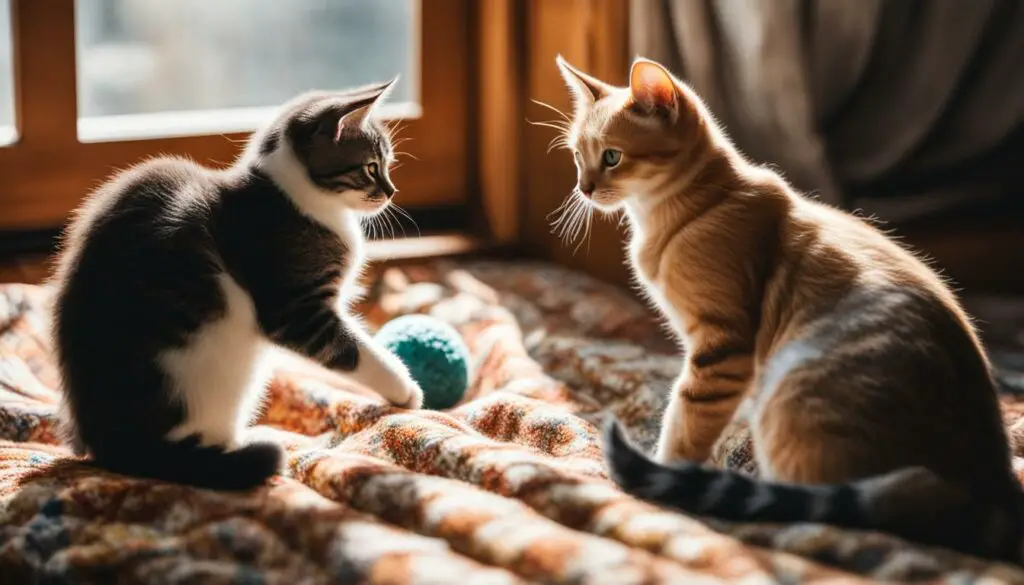
Caring for Littermates that Became Lone Cats
When a cat loses its littermate, it can be a challenging time for both the cat and the owner. The surviving cat may experience grief and exhibit behavioral changes. It’s important to provide proper care and support during this transition period.
One consideration is whether to introduce another cat as a replacement companion. However, it’s crucial to allow the surviving cat enough time to grieve and adjust to the loss before considering a new addition. Rushing the process can cause additional stress and may not be beneficial for the grieving cat’s well-being.
Observation and understanding the surviving cat’s needs are key in this situation. It’s essential to assess their behavior, appetite, and overall demeanor. Once the cat’s behavior returns to baseline and they show signs of readiness, it may be appropriate to start exploring the introduction of a new cat.
During the introduction process, it’s important to provide a gradual and controlled environment. Keep the new cat separate from the surviving cat at first, allowing them to become accustomed to each other’s scent and presence through scent swapping and visual introductions. Slowly increase their interactions under supervision, ensuring positive experiences and rewarding good behavior. Patience and a gentle approach are crucial in creating a harmonious relationship between the cats.
| Tips for Caring for Littermates that Became Lone Cats | |
|---|---|
| Tip 1 | Give the surviving cat time to grieve and adjust before introducing a new cat. |
| Tip 2 | Observe the surviving cat’s behavior, appetite, and overall demeanor to determine their readiness for a new companion. |
| Tip 3 | Start the introduction process slowly, with scent swapping and visual introductions, before progressing to supervised interactions. |
| Tip 4 | Be patient and provide positive experiences and rewards during the integration process. |
Should I Get a Kitten for My Cat?
Before making the decision to adopt another cat or get a kitten for your cat, there are a few important factors to consider. While the benefits of multi-cat companionship can be rewarding, it’s essential to think about your own time and resources. Cats require attention and care, and adding another cat to your household should be a well-thought-out decision.
Assessing your cat’s behavior and needs is crucial in determining whether they would benefit from the addition of a kitten. Some adult cats may not tolerate the presence of another cat, while others may thrive with a feline companion. Consulting with a veterinarian or animal behaviorist can provide valuable insight into your cat’s personality and tendencies towards sociability with other cats.

In addition to considering your cat’s needs, evaluate your ability to provide for multiple cats financially and emotionally. Having multiple cats can come with challenges such as increased costs for food, litter, and veterinary care. It’s important to ensure you can meet the individual needs of each cat and create a harmonious living environment.
Ultimately, the decision to adopt another cat or get a kitten for your cat should be based on careful consideration of your cat’s personality and compatibility with other cats, as well as your own ability to provide the necessary care and resources. By taking the time to assess these factors, you can make an informed decision that will benefit both your cat and your household.
Things to Consider Before Getting a Kitten for Your Cat
Before making the decision to get a kitten for your cat, there are several factors to consider. It’s important to assess your cat’s age, personality, and past experiences with other cats. Some cats may not tolerate the presence of another cat, while others may thrive with the companionship. Consulting with a veterinarian or animal behaviorist can provide valuable insights into your cat’s behavior and help you make an informed decision.
1. Compatibility: Consider your cat’s sociability with other cats. If your cat has shown aggression or territorial behavior towards other cats in the past, it may be best to avoid introducing a new kitten. However, if your cat has had positive interactions with other cats or has lived with other cats before, it may be more likely to accept a new companion.
2. Energy Level: Take into account your cat’s energy level. If your cat is older and less active, a high-energy kitten may be overwhelming and lead to stress or conflicts. On the other hand, if your cat is playful and enjoys interacting with other cats, a kitten may provide much-needed stimulation and playtime.
3. Resources: Consider the resources you have available for multiple cats. Adding a new kitten means providing additional food, litter, veterinary care, and toys. It’s essential to ensure that you have the financial means to provide for the needs of both cats and that you can dedicate enough time and attention to each individual.
| Things to Consider Before Getting a Kitten for Your Cat | Summary |
|---|---|
| Compatibility | Assess your cat’s sociability with other cats based on past behavior. |
| Energy Level | Consider your cat’s activity level and whether a high-energy kitten would be a good match. |
| Resources | Evaluate your financial ability to provide for the needs of multiple cats. |
By taking these factors into account, you can make an informed decision about whether getting a kitten for your cat is the right choice. Remember, every cat is unique, and what works for one may not work for another. Observing your cat’s behavior, consulting professionals, and prioritizing the well-being of your cat will help ensure a harmonious and fulfilling multi-cat household.
Travel and Multiple Cats
When it comes to traveling with multiple cats, there are a few important considerations to keep in mind. Whether you’re going on a weekend getaway or a longer vacation, you want to ensure that your cats are well taken care of in your absence. Here are some tips to help you navigate the logistics of caring for multiple cats while you’re away:
1. Plan for pet sitters or boarding facilities
When you have multiple cats, it can be challenging to find someone who can provide proper care for all of them while you’re away. Hiring a professional pet sitter or opting for a reputable boarding facility can ensure your cats receive the attention, feeding, and litter box maintenance they need. Make sure to book their services well in advance, especially during peak travel seasons.
2. Prepare a detailed care guide
Leave a comprehensive care guide for your pet sitter or boarding facility to ensure that all of your cats’ needs are met. Include important information such as feeding schedules, dietary restrictions, medication instructions, litter box cleaning routines, and any specific behaviors or preferences for each cat. This will help maintain consistency in their care while you’re away.
3. Test the compatibility of your cats
Before you leave your cats in the care of someone else, it’s important to ensure that they are comfortable with each other’s presence. If you recently introduced a new kitten to your cat, make sure they have had sufficient time to adjust and get along. Consider leaving them alone together for short periods of time to assess their compatibility before your trip.
| Cats’ Compatibility | Action |
|---|---|
| Compatible | Leave them together with access to all necessary resources. |
| Not Yet Compatible | Separate them in different areas of the house or consult a professional for further advice. |
By ensuring that your cats are comfortable and well-cared for while you’re away, you can enjoy your trip with peace of mind. Taking the time to plan ahead and make the necessary arrangements will help ensure a stress-free experience for both you and your feline companions.
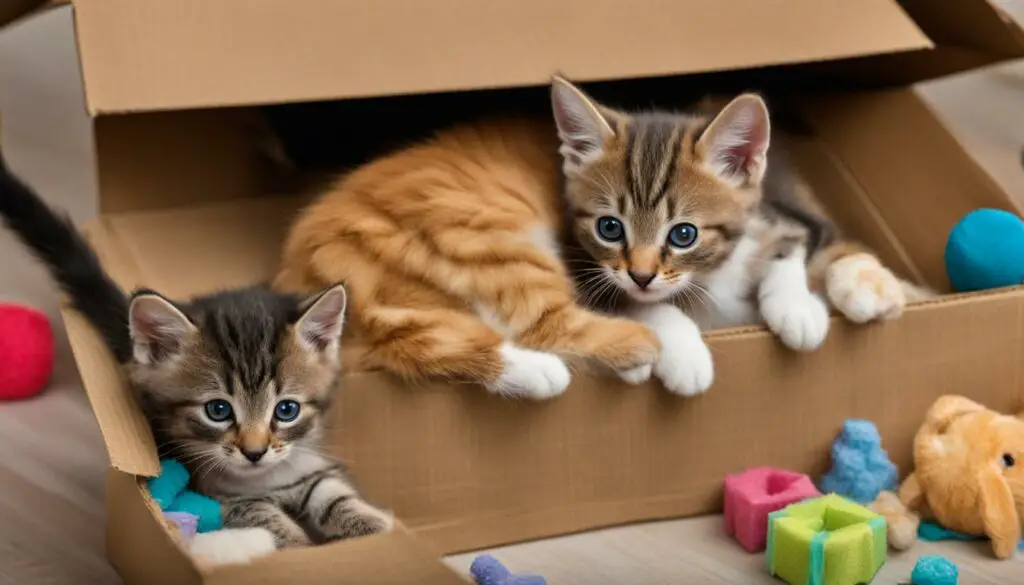
Creating a Harmonious Multi-Cat Household
Introducing a new kitten to your cat requires patience, observation, and gradual introductions. It’s important to provide each cat with their own space, resources, and attention to help them adjust to the new dynamic. Here are some steps to follow when introducing a new kitten to your cat:
Step 1: Prepare a separate space
Before bringing the new kitten home, create a separate area for them with their own bedding, food, water, and litter box. This will allow both cats to get familiar with each other’s scents without direct contact. Gradually introduce their scents by swapping bedding or rubbing a cloth on each cat and placing it in the other’s space.
Step 2: Visual introductions
Allow the cats to see each other without direct physical contact. Use a baby gate or keep the new kitten in a carrier while the resident cat explores the room. This visual introduction will help them get used to each other’s presence without feeling threatened. If either cat shows signs of aggression or stress, separate them and try again later.
Step 3: Controlled interactions
Once both cats are comfortable with the visual introductions, you can start allowing them to have supervised interactions. Use a harness and leash for both cats to ensure control and prevent any potential fights. Allow them to interact for short periods, gradually increasing the duration as they become more comfortable with each other.
Monitor their body language during interactions. Signs of aggression, such as hissing, growling, or raised fur, may indicate that they need more time to adjust. If necessary, separate them and try again another time. Positive reinforcement, such as treats and praise, can be used during interactions to create positive associations between the cats.

Step 4: Provide individual attention
Throughout the process of introducing a new kitten to your cat, it’s crucial to provide each cat with individual attention and affection. Spend quality time with each cat separately to maintain their bond with you. This will help prevent any feelings of jealousy or neglect.
Remember, every cat is unique, and the time it takes for them to adjust to each other may vary. Be patient and allow them to set the pace. If the integration process becomes overwhelming or you encounter difficulties, consider seeking advice from a veterinarian or animal behaviorist.
The Joy of Multi-Cat Companionship
Having multiple cats in your household can be a source of great joy and enrichment for both your feline friends and yourself. Cats are social animals, and providing them with a companion can fulfill their need for social interaction and playmates. Watching your cats interact with each other can be a heartwarming experience as they establish bonds and engage in various playful activities.
One of the advantages of having a kitten with your cat is the companionship they can provide. Kittens are typically full of energy and enthusiasm, and their presence can encourage your adult cat to engage in more playtime and physical activity. They can chase each other, wrestle, and engage in interactive play, which not only provides entertainment but also helps to keep them mentally stimulated.
“The presence of a kitten can also help alleviate boredom and loneliness for your cat, especially if they spend long periods alone during the day.”
Additionally, kittens can learn social behavior from their older feline companion, such as proper grooming techniques and communication signals. This can help them develop important social skills that will benefit them throughout their lives. It’s truly a delight to witness the unique bond that forms between cats, as they establish their own hierarchy, communicate through body language, and provide each other with comfort and companionship.
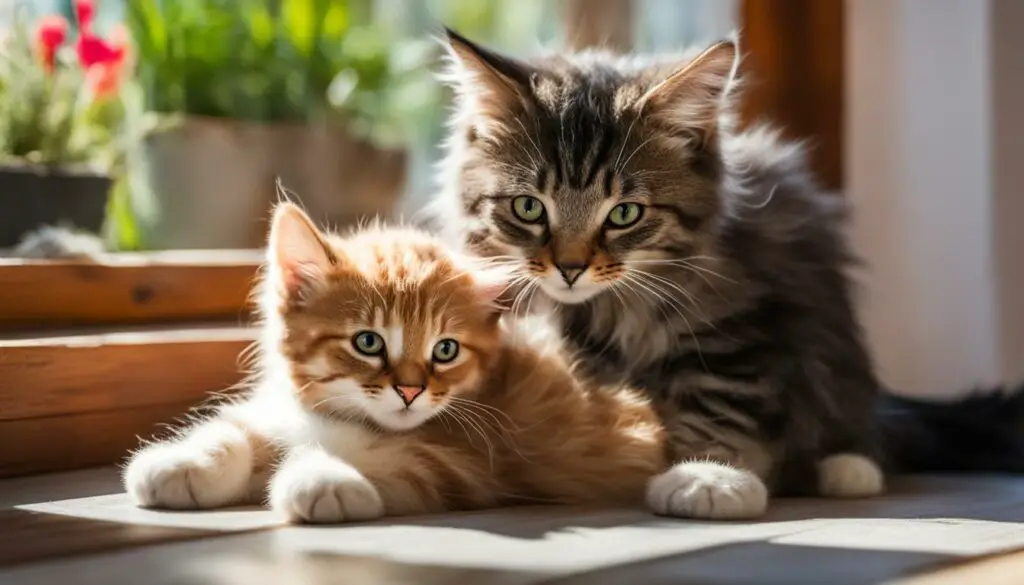
| Advantages of Having a Kitten with My Cat |
|---|
| Companionship and social interaction |
| Increased playtime and mental stimulation |
| Learning social behavior from another feline |
| Opportunity for entertainment and alleviating boredom |
Meeting Your Cat’s Social and Activity Needs
When considering getting a kitten for your cat, there are several factors to take into account. It’s important to ensure that your cat’s social and activity needs will be met in a multi-cat household. By providing opportunities for social interaction and engaging activities, you can help keep your cats happy, healthy, and fulfilled. Here are some things to consider:
- Playtime: Cats require regular play sessions to stay mentally and physically stimulated. Set aside dedicated playtime each day to engage your cats in interactive play using toys that mimic prey behavior. This will help satisfy their natural hunting instincts and provide an outlet for their energy.
- Socialization: Cats are social animals, and they benefit from companionship. If your cat enjoys the company of other cats, getting a kitten can provide a playmate and a source of social interaction. However, it’s essential to consider your cat’s temperament and past experiences with other cats before making the decision.
- Enrichment: Create an enriching environment for your cats by offering a variety of toys, scratching posts, and climbing structures. This will give them opportunities for exploration, exercise, and mental stimulation. Rotate their toys regularly to keep them engaged and prevent boredom.
- Separate Resources: Ensure that each cat has their own food and water bowls, litter boxes, and resting areas. This will help avoid conflicts and allow each cat to have their own space. It’s important to provide enough resources for all the cats in the household.
By considering these factors, you can make informed decisions about getting a kitten for your cat and create a harmonious multi-cat household. Remember to observe your cats’ behavior and consult with a veterinarian or animal behaviorist if you have any concerns or questions.

Table: Meeting Your Cat’s Social and Activity Needs
| Aspect | Considerations |
|---|---|
| Playtime | Set aside dedicated playtime using interactive toys |
| Socialization | Assess your cat’s temperament and past experiences with other cats |
| Enrichment | Provide a variety of toys, scratching posts, and climbing structures |
| Separate Resources | Ensure each cat has their own food, water, litter boxes, and resting areas |
Monitoring Your Cat’s Well-being in a Multi-Cat Household
In a multi-cat household, it is essential to regularly monitor the well-being of each cat to ensure they are happy and healthy. Here are some key considerations for monitoring your cat’s well-being:
1. Observing Behavior and Interactions
Pay attention to how your cats interact with each other. Look for signs of aggression, excessive hiding, or withdrawal, as these could indicate stress or conflict. Additionally, monitor their eating, drinking, and litter box habits to ensure they are staying active and maintaining a healthy routine. If you notice any changes in behavior or routine, consult with a veterinarian to rule out any underlying health issues.
2. Providing Individual Attention
While cats in a multi-cat household can enjoy companionship, it’s important to give each cat individual attention and quality time. Spend one-on-one time with each cat, engaging in activities they enjoy, such as playtime, grooming, or cuddling. This helps to strengthen the bond between you and your cats and ensures they feel loved and valued as individuals.
3. Maintaining a Balanced Diet
Diet plays a crucial role in your cat’s overall well-being. Ensure that each cat receives a nutritionally balanced diet appropriate for their age, breed, and health condition. Monitor their eating habits, weight, and body condition to make sure they are maintaining a healthy weight. If you have cats with different dietary needs, consider feeding them separately to prevent any issues.
By closely monitoring your cats’ behavior, providing individual attention, and maintaining a balanced diet, you can ensure the well-being of each cat in your multi-cat household. Regular veterinary check-ups are also important to detect any health issues early on and provide appropriate care. Remember, a happy and healthy cat is a content member of your furry family.
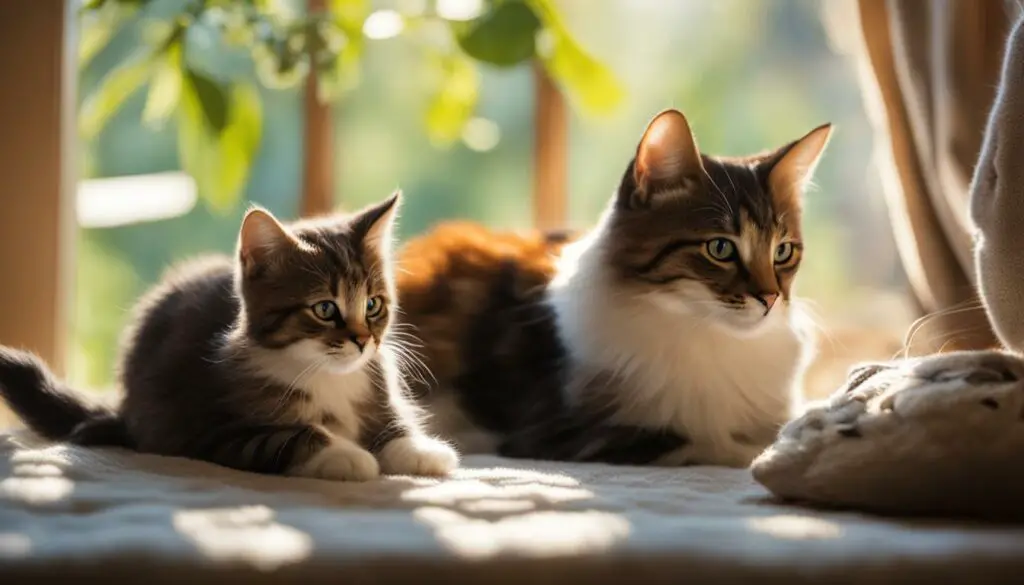
Conclusion
Should I get a kitten for my cat? It’s a question many cat owners ponder, weighing the benefits and considering the factors involved. Adding a kitten to your cat’s life can offer numerous advantages and enrich their companionship.
Getting a kitten for your cat provides not only a playmate but also increased mental stimulation and social interaction. Kittens are full of energy and can help alleviate boredom and loneliness for your cat. Additionally, they can teach your cat social behaviors and offer entertainment.
However, before making the decision, it’s crucial to consider your cat’s age, personality, and past experiences with other cats. While some cats may thrive with the addition of a kitten, others may prefer to be the sole feline in the household. Careful observation, consultation with a professional, and assessing your own ability to provide for multiple cats should guide your decision-making process.
In conclusion, deciding to get a kitten for your cat should be a thoughtful choice that takes into account your cat’s needs and compatibility. While there are benefits to having multiple cats, it’s important to consider the challenges and responsibilities that come with it. By providing individual attention, meeting their social and activity needs, and monitoring their well-being, you can foster a harmonious and fulfilling multi-cat household.
FAQ
Should I get a kitten for my cat?
The decision to get a kitten for your cat should be made on a case-by-case basis considering your cat’s personality and tendencies towards sociability with other cats.
What are the benefits of getting a kitten for my cat?
The benefits of getting a kitten for your cat include companionship, increased playtime and mental stimulation, and the opportunity for your cat to learn social behavior from another feline.
What things should I consider before getting a kitten for my cat?
Before getting a kitten for your cat, consider your cat’s age, personality, and past experiences with other cats. It’s important to assess your cat’s behavior and consult with a veterinarian or animal behaviorist before making a decision.
How do I introduce a new kitten to my cat?
Introducing a new kitten to your cat should be done gradually and with care. Start by providing a separate area for the new kitten with their own bedding, feeding, and elimination stations. Slowly introduce the cats through visual introductions and scent swapping, and gradually allow them to have supervised interactions.
Should I consider adopting a second cat for my adult cat?
When considering adopting a second cat for your adult cat, keep in mind their temperament and preferences. It’s important to carefully assess your cat’s behavior and seek professional advice if needed.
How can I meet the needs of multiple cats?
Having multiple cats requires providing ample social interaction, physical exercise, mental stimulation, and playtime for each cat. Ensure enough space, resources, and attention for each cat to thrive and avoid potential conflicts.
How do I care for littermates that became lone cats?
If a cat loses their littermate, it’s important to wait until the surviving cat’s behavior returns to baseline before considering getting another cat as a replacement companion.
How do I make the decision to adopt another cat?
Before deciding to adopt another cat, consider your own time and resources. Assess your cat’s behavior and needs, as well as your ability to provide for multiple cats, both financially and emotionally.
What challenges come with having multiple cats?
Having multiple cats can come with challenges such as increased cost, potential conflicts, and establishing a hierarchy among the cats. It’s important to provide enough resources and space for each cat to minimize stress and encourage harmonious coexistence.
How do I handle travel with multiple cats?
If you frequently travel, it’s important to consider the logistics of caring for multiple cats. Make any necessary arrangements for their care during your absence.
How can I create a harmonious multi-cat household?
Creating a harmonious multi-cat household requires patience, observation, and gradual introductions. Provide each cat with their own space, resources, and attention. Supervised interactions, positive associations, and careful management of potential conflicts can help facilitate a successful integration.
What are the joys of multi-cat companionship?
Multi-cat companionship can bring joy and enrichment to your cats’ lives. They can provide each other with social interaction, playmates, and a sense of belonging.
How do I meet my cat’s social and activity needs in a multi-cat household?
Whether you have one cat or multiple cats, it’s crucial to meet their social and activity needs. Regular playtime, interactive toys, and opportunities for exploring and climbing can help keep your cats physically and mentally stimulated.
How do I monitor my cat’s well-being in a multi-cat household?
Regularly monitor your cats’ overall well-being in a multi-cat household. Watch for signs of stress, territorial disputes, or health issues. Provide each cat with regular veterinary care, a balanced diet, and a safe and comfortable living environment.
Source Links
- https://vcahospitals.com/know-your-pet/considerations-when-getting-a-second-cat
- https://neaterpets.com/blogs/news/cat-companion
- https://www.reddit.com/r/CatAdvice/comments/wxllzp/considering_adopting_a_second_cat_as_a_companion/

